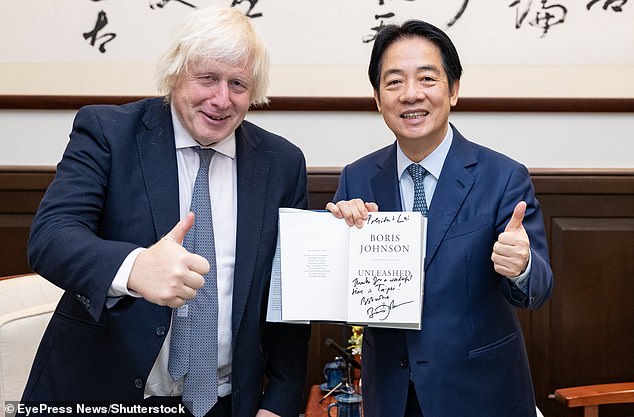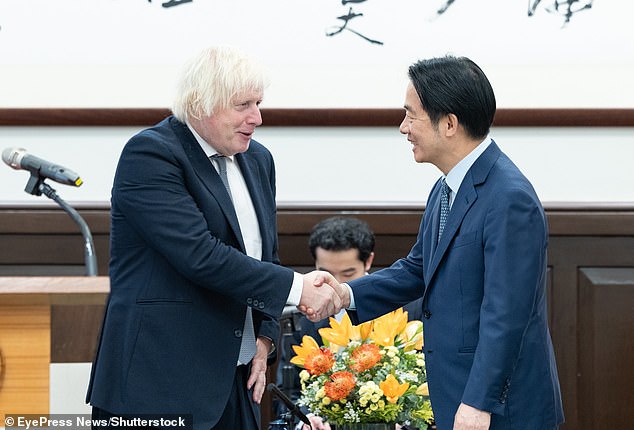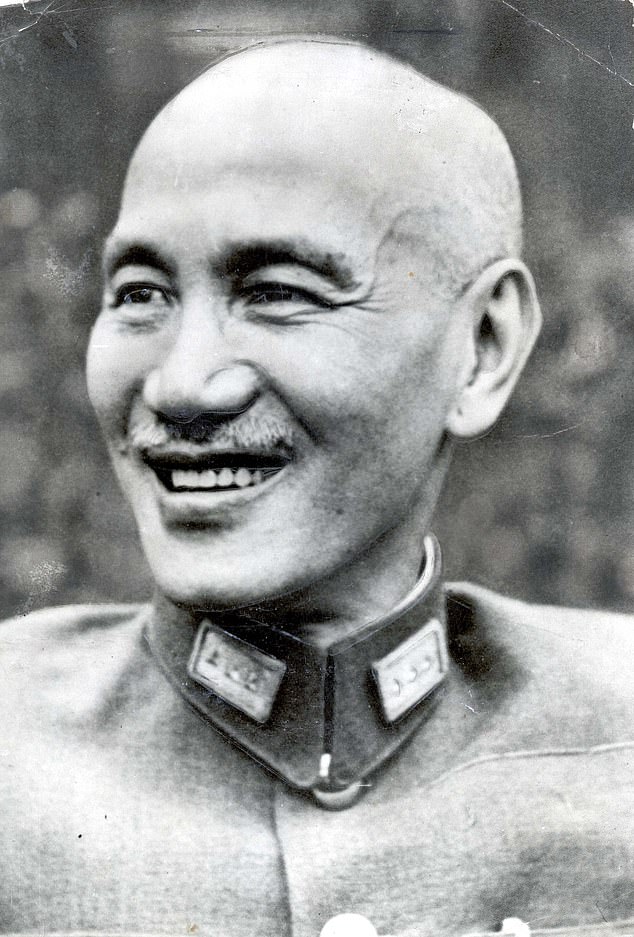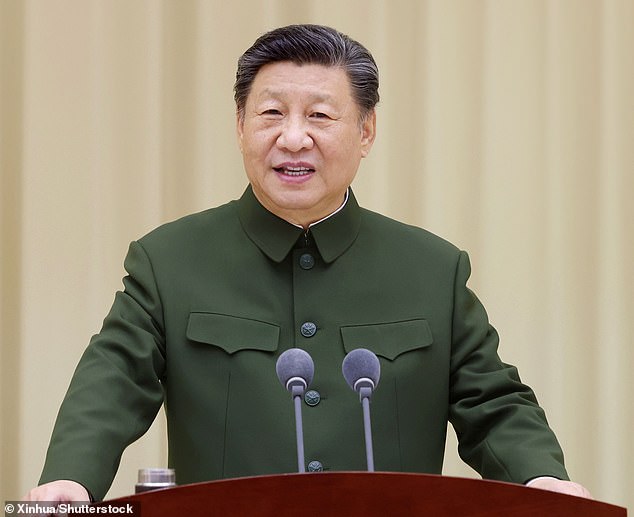I am sitting in the foreign ministry in Taipei with a tropical thunderstorm going crackers outside, and as lunch comes to an end I decide to put the crucial question.
Like everyone I have met in Taiwan, this group of political, diplomatic and business brains has been telling me about the increasing threat of a Chinese invasion.
They have described the bullying, the internet trolling, the lies, the propaganda and the hysterical shows of Chinese armed force in the waters of Taiwan: jets howling overhead, live fire operations, destroyers coming within a whisker of Taiwanese boats, even simulated blockades and landings.
They have told me how Taiwan is responding – increasing their defence spending, stepping up their training. But we all know that isn’t really the issue, not when an island of only 23 million people is pitted against the People’s Liberation Army.
The key calculation – the thing the military planners will really want to know, both in Beijing and Washington, is how the Taiwanese would respond.
‘Will you fight?’ I ask the assembled company.
‘I will fight,’ says the young man on my left, instantly, and a few other men chime their assent.
Then there is a pause – because we all know what that means. It means slaughter, ghastly and pointless slaughter – on both sides. It would not be easy for Beijing to take Taiwan, which is at least 80 miles from the mainland and with rocky cliffs on much of the coast.

Boris Johnson meets Taiwanese president Ching-te Lai in Taipei – where he heard about the increasing threat of a Chinese invasion

If Taiwan were overwhelmed, it would be a strategic disaster for the West – since Taiwan now makes 95 per cent of the advanced chips needed for artificial intelligence, says Boris Johnson
But most analysis predicts that without help the Taiwanese would sooner or later be overwhelmed. That would mean, of course, an absolute strategic disaster for the West – since Taiwan now makes 95 per cent of the advanced chips needed for artificial intelligence.
Which means that if Xi Jinping takes Taiwan he will have his thumbs on the windpipe of the most important and valuable new technology of the 21st century. And if Beijing takes Taiwan – look at the map – he will have a huge foothold in the ‘first island chain’ between Japan and the Philippines, and vastly increased scope to project Chinese force into the Pacific.
Even more importantly, an invasion would mean the violent toppling of a democratic government – in total defiance of the wishes of the Taiwanese – when the actual Chinese claim to Taiwan is of no merit whatever.
For most of recorded history –up until the arrival of European colonists in the 17th century – the inhabitants of Taiwan were 16 mutually unintelligible Austronesian tribes. It was only the Dutch and Spanish invaders who started to import Chinese speakers from the mainland.
In 1683 representatives of the Qing dynasty arrived and though they brought in many more Han Chinese, and greatly changed the demographic balance, there were still large parts of the island that they did not control.
This partial colonisation by Qing China continued until 1895 when the island fell to the Japanese, who were to rule Taiwan for the next 50 years.
It is one of the most curious features of modern Taiwan that many people are by no means entirely hostile to the memory of that epoch. Whatever the horrors the Japanese inflicted on Korea or mainland China, the legacy here seems more mixed.
The Japanese gave Taiwan roads and ports and even the foreign ministry building in which we are sitting, a large handsome 1930s structure of stone and white stucco.
Older people can speak Japanese. Today’s Taiwanese still use a smattering of Japanese loan words, like the words for taxi driver (‘unchan’) or lunch box (‘bento’). I ask them where they are going on holiday and they all, almost without exception, say they are going to Japan.

Chiang Kai-shek fled to Taiwan in 1949, where – deprived by the communists of his dream of governing China – he ruled the island with an iron fist

Xi has at one stage threatened to take over Taiwan by 2027, and since we must take him seriously the question is how to stop him
As my hosts hasten to explain, there is a simple reason for the apparent fondness with which they remember imperial Japan – and that is because their administration seemed benign by comparison with what came next.
This was the regime of the generalissimo Chiang Kai-shek of the Kuomintang, who helped to defeat the Japanese in 1945, and kicked them out of Taiwan, but who then lost the Chinese civil war to Mao and the Communists.
Chiang Kai-shek fled to Taiwan in 1949, where – deprived by the communists of his dream of governing China – he ruled the island with an iron fist. He is remembered now for instituting the ‘White Terror’ and the world’s longest ever period of martial law.
It was only when he died in 1975 that Taiwan started to become what it is today: a buzzing, thriving democracy with ferociously contested elections and a free press. It is partly because Taiwan is free that it has been so economically successful and technologically dynamic, especially in the field of semiconductors.
Creativity generally goes hand in hand with freedom of thought and freedom of speech, and brilliant people on the whole like to live in free societies. That is one of the reasons why the Taiwanese are so utterly determined not to become another province of communist China. Like the rest of us, they can see the tragedy of Hong Kong.
They can see what happens when China takes over – the complete betrayal of all promises China made to Britain, first to Mrs Thatcher in 1984 and then at the handover in 1997.
The Chinese have cynically scrapped the ‘one country, two systems’ model; they have scrubbed elections, jailed journalists, disappeared dissenters and tear-gassed protesters.
Looking at Hong Kong, it is no wonder the Taiwanese have become more and more passionate in defending their de facto political independence.
Many of them used to say they had a shared identity: Taiwanese first and Chinese second. In a poll this year 77 per cent say they are Taiwanese only.
That is why Xi Jinping thinks the matter is so urgent; that is why he wants to stifle Taiwan – for the obvious reason that he is a communist and he doesn’t want a thriving, independent Chinese-speaking democracy on his doorstep.
Xi has at one stage threatened to take over Taiwan by 2027, and since we must take him seriously the question is how to stop him. The US is already legally committed to arming Taiwan, and it is hard to see how any US President could allow such a geo-strategic catastrophe as the loss of democratic, chip-producing Taiwan.
If America gets involved, it is hard to see countries like Britain and Australia doing nothing.
Let us hope and pray that Xi draws the correct lesson from Putin’s disaster in Ukraine – that war is unpredictable, and that when people are fighting for their independence, they fight with a passion that is almost impossible to beat.
These people want to be free. They don’t want to be ruled by Beijing. They have learned the lesson of Hong Kong – that communist Beijing’s assurances are not to be trusted.
We must pray it never comes to war and on balance I still don’t think it will.
But if it does, I think the Taiwanese will fight and I doubt very much they will be on their own.












